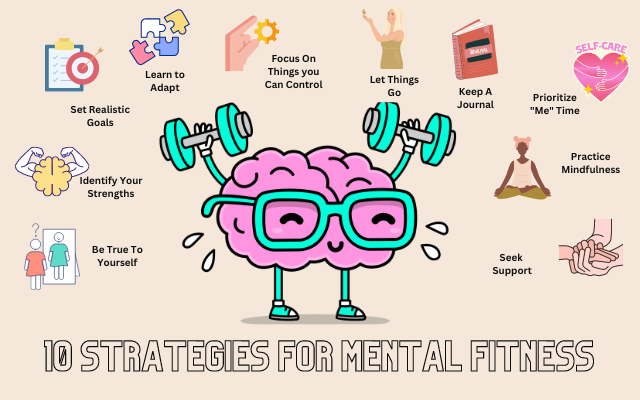
Understanding the Importance of Mental Fitness
Introduction
Have you ever felt like the hustle and bustle of life has pushed your mental health to the sidelines? In this fast-paced world, it’s easy to prioritize physical health while neglecting what’s going on in our minds. Just like we hit the gym to stay fit, it’s equally important to nurture our mental wellness for emotional balance and resilience. Mental fitness is all about our thoughts, feelings, and behaviors, and it plays a huge role in how we view life. In this blog post, we’ll dig into what mental fitness really means, break down its key elements, share practical ways to improve it, and offer some expert tips to support you on your mental health journey.
Understanding the Importance of Mental Fitness
Let’s get real: mental fitness is just as crucial to our emotional health as physical fitness is to our bodies. It’s about cultivating a positive mindset and sharpening our thinking skills, which makes tackling life’s ups and downs a bit easier. Research shows that by strengthening our neural connections, we can keep a sunny perspective and lower our stress levels. It’s not just about dodging stress; it’s about becoming strong enough to face it head-on.
Takeaway Tip: Start tuning into your mental fitness by taking a few minutes every day to think about what really brings you joy. Whether that’s taking a stroll in the park, sharing a laugh with a friend, or losing yourself in a good book—whatever it is, make it a priority.
Key Components of Mental Fitness
Improving mental fitness isn’t a one-size-fits-all situation. There are four key ingredients that you can focus on: self-awareness, stress management, cognitive flexibility, and emotional regulation. Let’s break these down:
1. Self-Awareness: Knowing your thoughts and feelings is the first step to managing them. Journaling is a fantastic way to check in with yourself. Just set aside a few minutes each night to jot down your thoughts or how you’re feeling. You might notice patterns or triggers that you hadn’t before!
2. Stress Management: We all experience stress, but how we choose to handle it makes all the difference. Simple techniques like deep breathing, yoga, or even some light stretching can help ease tension and calm your mind.
3. Cognitive Flexibility: Life can throw curveballs, and being able to adapt is essential. Work on how you react when plans change—whether that’s switching up your daily routine or brainstorming different ways to solve a problem.
4. Emotional Regulation: This is all about recognizing and managing your emotions effectively. Using strategies like mindfulness or cognitive behavioral techniques can help you acknowledge your feelings without letting them take the wheel.
Takeaway Tip: Pick one of these components to focus on each week. For example, dedicate this week to enhancing your self-awareness by making journaling a daily habit.
Practical Strategies for Enhancing Mental Fitness
Ready to up your mental fitness game? Here are some easy, everyday strategies you can weave into your life:
1. Mindfulness and Meditation: Getting into mindfulness can give your focus and emotional strength a boost. Apps like Headspace or Calm offer beginner-friendly guided sessions. Start with just five minutes a day, and increase the time as you get more comfortable in the routine.
2. Cognitive Behavioral Practices: If those pesky negative thoughts start to creep in, challenge them! Use CBT techniques to reframe your thoughts with facts and positive affirmations.
3. Positive Affirmations: Make it a habit to say something positive to yourself every day. Simple affirmations like “I’m capable of handling whatever comes my way” can shift your mindset over time.
4. Engaging Activities: Dive into activities that keep your mind sharp—think puzzles, reading, or even playing video games. These fun activities can enhance your cognitive skills and keep your brain agile.
Takeaway Tip: Set yourself a goal to try something new each week—maybe it’s picking up a different book genre, testing out a new game, or diving into a hobby you’ve always wanted to explore.
How to Apply This Information
So, how do you actually bring mental fitness into your everyday life? Let’s break it down into manageable steps:
1. Set Clear Goals: Think about specific areas of mental fitness where you’d like to grow. Whether it’s emotional regulation or boosting self-awareness, write down some measurable goals.
2. Create a Routine: Make practices like mindfulness, journaling, or stress management part of your daily life. Maybe carve out some morning time for a quick mindfulness exercise.
3. Seek Support: You don’t have to do this all alone. Find friends or peers to share your mental fitness journey with—whether it’s in person or online. Having a support system can make a world of difference in keeping you motivated.
4. Monitor Progress: Keep track of your daily mental fitness activities and how they influence your mood. Over time, you’ll start to see patterns that can help maintain a healthier state of mind.
Conclusion
Nurturing your mental fitness isn’t just a passing fad; it’s essential for leading a balanced and fulfilling life. By recognizing its significance, understanding its key components, and applying practical strategies, you can boost your emotional resilience and overall well-being. Remember, take it one step at a time, find your tribe for support, and celebrate your wins along the way. What’s your plan for enhancing your mental fitness? I’d love to hear your experiences in the comments below. Together, let’s build a community that values mental health as much as physical health!
Written by Alexander Babinets
Founder of Express Fitness, certified coach, and author helping people get in shape without excuses.
📍 expressfitness.ca | 📩 info@expressfitness.ca
👤 More about me → alexanderbabinets.com
Hashtags: #mental #fitness #like #life #into #emotional #about #health #just #stress #thoughts #down #some #cognitive #mindfulness
